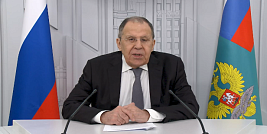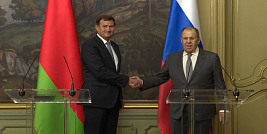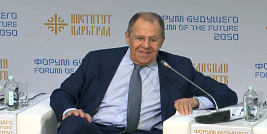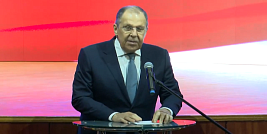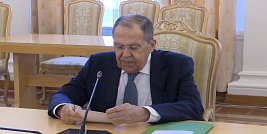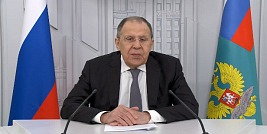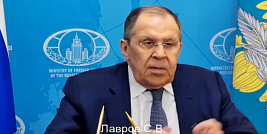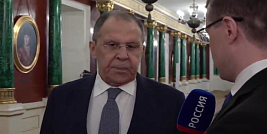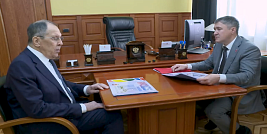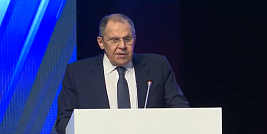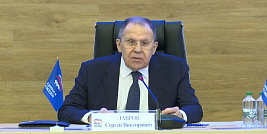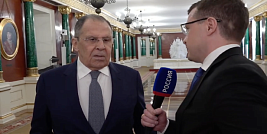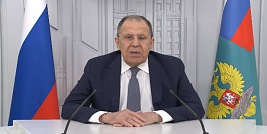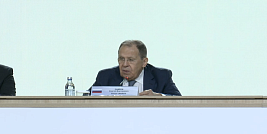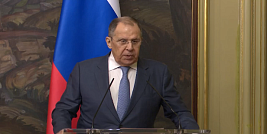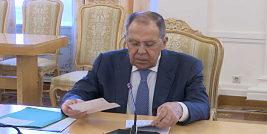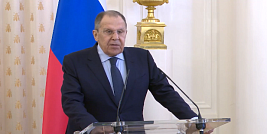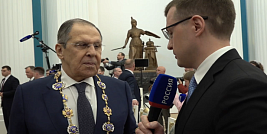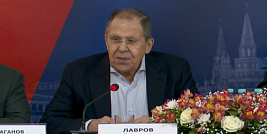Foreign Minister Sergey Lavrov’s remarks and answers to media questions at a joint press conference following talks with Foreign Minister of the Federal Republic of Nigeria Yusuf Tuggar, Moscow, March 6, 2024
Ladies and gentlemen,
We held very substantive talks with Foreign Minister of the Federal Republic of Nigeria Yusuf Tuggar. We reaffirmed the importance of regular political dialogue between our countries and noted progress in Russian-Nigerian relations. We are resolved not only to keep up this trend but also to strengthen it.
We will do this in all spheres of our relations but primarily in our trade and economic cooperation. We highlighted the most promising spheres such as energy, the construction of infrastructure facilities, agriculture, healthcare and education. We have agreed to focus on and to give every organisational and diplomatic support to the development, expansion and strengthening of contacts between our business communities. With this aim in view we have agreed to stimulate the activities of the Intergovernmental Commission for Trade, Economic, Scientific and Technological Cooperation and to make use of the capabilities of the Russia-Nigeria Business Council.
We need to improve out legal framework for implementing projects of mutual interest. We have an interest in implementing the agreement on military-technical cooperation, which has recently been extended. Our Nigerian friends are interested in this too.
We are paying priority attention to our humanitarian and cultural spheres, especially education and the training of Nigerian professionals at Russian universities. We could develop direct ties between our countries’ universities. I hope we will do this soon.
We have reaffirmed out commitment to promoting the development of a fair polycentric world order. This objective trend reflects the continuing sustainable growth of the economic, financial and political prestige of countries of the Global South and East on the global stage. It is fully in line with the high principles set out in the UN Charter, which stipulate that international relations must be based on the sovereign equality of states.
We also agree on the other principles of the UN Charter such as non-interference in the internal affairs of sovereign states. We share the opinion that there is no place for the rudiments of neocolonial practices in interstate relations, which are still suffering from the inertia of colonial policies. Our countries are resolved to strengthen their coordination at the UN.
We maintain close cooperation and support each other, in particular, during elections to various UN bodies. Russia has reaffirmed its commitment to ensuring full respect for developing countries, including African ones, and their interests during the reform of the UN Security Council. Our position, which we have put forth many times, is that the UNSC must be reformed to give broader representation to African, Asian and Latin American countries. Western countries are clearly over-represented there. This injustice must be rectified.
We talked about the persisting crises in Africa, primarily, in the Sahara-Sahel region. Recent events in Mali, Niger and Burkina Faso have changed the nature of relations with the Economic Community of West African States (ECOWAS). Russia and the ECOWAS have been developing friendly ties for a long time. They are interested in the ability of the region’s countries to preserve their common positions of solidarity in countering universal threats. This goal requires the pooling of efforts rather than dividing lines.
We expressed the hope that both sides (the new authorities in Mali, Niger and Burkina Faso) and ECOWAS leadership would take steps to meet each other halfway and that inevitably arising issues would be resolved through dialogue and a search for a balance of interests. For our part, we expressed our willingness to facilitate these processes and emphasised the importance of maintaining the integration potential of the community.
We also emphasised the need to counter terrorist jihadi groups, and illegal arms, and human and drug trafficking in the region. These problems still exist in many parts of Africa. We welcome Nigeria’s substantial contribution and motivation to continue countering these threats and achieve results.
We exchanged views on the situation in Sudan. Both Nigeria and Russia favour an end to the armed confrontation and support for African Union mediation. In any event, Russia is and will be making a constructive contribution to the efforts of the Africans and the international community in general to stabilise the situation in the Sahara-Sahel region. We will help the countries of the region enhance their security and the combat capability of their national armed forces and law-enforcement bodies with a view to countering persisting threats.
We could not neglect the serious situation in the Middle East, primarily due to the unprecedented escalation of the Palestinian-Israeli conflict in the context of the tragedy unfolding in the Gaza Strip. We favour the consolidation of international efforts to achieve a ceasefire as soon as possible and to create conditions for the needed humanitarian and other assistance. We believe it is necessary to immediately start the real work on reaching an agreement on the foundations of a Palestinian state in accordance with the resolutions of the UN Security Council and the General Assembly.
We thanked our Nigerian colleagues for understanding the situation in Ukraine and the reasons that had been created over many years due to the policy of the Western countries that wanted to turn Ukraine into a serious threat to the Russian Federation, our citizens, culture and the Russian language. We appreciate Nigeria’s well-balanced position on the discussion of Ukrainian issues at the UN. We agreed to continue our contacts. I consider the results of our talks to be very useful.
Question: What do you think about the status of and prospects for bilateral relations, partly in the context of implementing the resolutions from the Second Russia-Africa Summit?
Sergey Lavrov: The Second Russia-Africa Summit took place in St Petersburg in July 2023. Vice President Kashim Shettima headed the Nigerian delegation. Foreign Minister Yusuf Maitama Tuggar was among the members. Russian and Nigerian representatives had bilateral meetings during this summit like they did on the sidelines of the First Russia-Africa Summit held in Sochi in October 2019. After holding these meetings, it is easier to discuss the bilateral agenda. We have listed the items that include a number of areas in the real economy (energy, agriculture, the pharmaceutical industry, epidemic control, as well as transport and other infrastructure issues).
Nigeria is one of Africa’s biggest countries and our priority partner in the region. Russia’s relations with the African nations rest on the enduring foundation and implementation of adopted plans.
The participants in the Second Russia-Africa Summit adopted a declaration by the leaders, a plan of action in 2023-2026 and other resolutions to ensure cyber security in today’s information space, to combat terrorism and to prevent an arms race in outer space. We have held these positions for a long time, and most African nations support them. In practical terms, the Americans are blocking any agreements on preventing an arms race in space at the UN. They prefer to accuse us of trying to spread the arms race in space and they express their suspicions about this. To mitigate these suspicions all they need to do is sign the treaty that has been submitted for many years and is acceptable to almost every other state.
The second summit produced one more change: we agreed to hold a Russia-Africa Foreign Minister Forum every year. We are preparing it for next autumn. Sochi is most likely to be the venue. We will start sending our proposals on the agenda and invitations soon.
